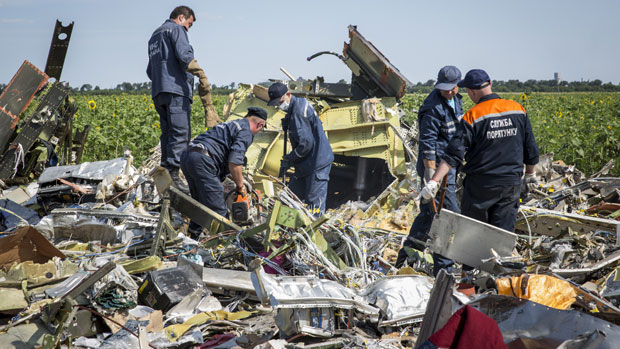Top Putin aide linked to downing of Malaysia Airlines Flight MH17
Authorities say intercepted phone calls may implicate Russian officials in 2014 missile attack

A free daily email with the biggest news stories of the day – and the best features from TheWeek.com
You are now subscribed
Your newsletter sign-up was successful
International investigators have released recordings of intercepted telephone calls that suggest top Russian officials coordinated the missile attack on Malaysia Airlines flight MH17.
The Kremlin has denied involvement in the 2014 attack, which claimed the lives of all 298 people on board the downed Boeing 777. But the Dutch-led joint investigative team (JIT) say that the records reveal ties between a senior aide to Russian President Vladimir Putin and Ukrainian separatist militants accused of firing the Buk missile.
What happened to MH17?
The Week
Escape your echo chamber. Get the facts behind the news, plus analysis from multiple perspectives.

Sign up for The Week's Free Newsletters
From our morning news briefing to a weekly Good News Newsletter, get the best of The Week delivered directly to your inbox.
From our morning news briefing to a weekly Good News Newsletter, get the best of The Week delivered directly to your inbox.
Malaysia Airlines flight MH17 left Amsterdam’s Schiphol Airport at 12.31pm local time on 17 July 2014 and was due to land in the Malaysian capital Kuala Lumpur the following day.
Instead, the Boeing 777 broke apart in mid-air following an explosion near the cockpit as the aircraft flew over eastern Ukraine near the Russian border.
A total of 283 passengers, including 80 children, and 15 Malaysian crew members were killed. The victims included 193 Dutch citizens, 43 Malaysians, 38 Australians, 12 Indonesians and ten Britons, while the remainder were from Belgium, Canada, Germany, New Zealand and the Philippines.
Who are the suspects?
A free daily email with the biggest news stories of the day – and the best features from TheWeek.com
The JIT inquiry concluded that a Russian-built Buk surface-to-air missile brought across the border from Russia had shot down the plane.
Three Russians and a Ukrainian were charged with murder in June over the attack and warrants issued for their arrests.
The accused men - Igor Girkin, Oleg Pulatov and Sergei Dubinsky, and Ukrainian Leonid Kharchenko - were all leading members of the Donetsk People's Republic (DPR), a self-declared separist state within Ukraine.
They are due to go on trial in absentia in the Netherlands in April 2020.
Girkin, who was the "defence minister" of the DPR at the time of the attack, has publicly denied that the militia he commanded shot down the aircraft, reports The Telegraph.
But the newly released phone recordings - provided by Ukrainian intelligence - suggest otherwise, investigators say.
In the tapes, recorded between June and July 2014, high-ranking Russian officials are allegedly heard speaking with DPR leaders including Girkin and Alexander Borodai, the then so-called prime minister of the self-declared DPR.
Although MH17 is specifically not mentioned in the recordings, Borodai is heard being promised military assistance by Vladislav Surkov, a close ally and personal adviser to President Putin. Surkov has been separately accused of orchestrating Russian actions in eastern Ukraine, The Times reports.
“I’m carrying out orders and protecting the interests of one state, the Russian Federation. That’s the bottom line,” Borodai reportedly says.
Another significant communication took place in early July 2014, when an unnamed DPR member is said to have told a local commander that “men are coming with a mandate from Shoigu” - an apparent reference to Sergei Shoigu, the Russian defence minister since 2012.
The DPR member claims the men have been ordered to “kick the local warlords out of the units” before “people from Moscow” take charge of command from the separatists. “We’re moving towards a unity of command,” the unknown man adds.
The JIT has also uncovered evidence that suggests the Russian Federal Security Service (FSB) provided the rebels with telephones that could not be wiretapped.
In a conversation on 3 July, Girkin's deputy Dubinsky - another of the men facing trial - allegedly told an unknown militant known only as Semenov that “those are special phones, you cannot buy them. They are gotten through Moscow. Through FSB.”
What has the response been?
The BBC reports that the JIT now believes that “Moscow officials knew what was going on on the ground” in the DPR and had influence over “administrative, financial and military matters” in the republic.
But Russia has moved to dismiss the JIT’s claims, with the Foreign Ministry describing the recordings claims as “fake news”.
“What are they [the conclusions] based on? Publication of materials, some of which immediately turn out to be fake, and some of which don't check out? We've been through this already,” a spokesperson said.